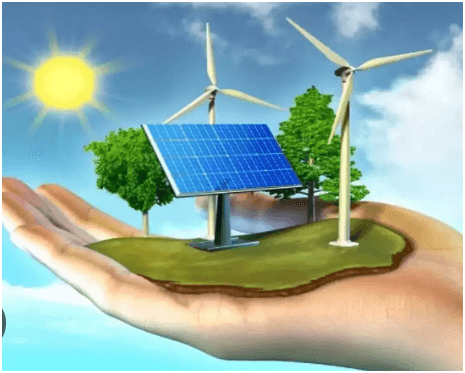Abu Dhabi is making significant strides in advancing its renewable energy projects as part of the UAE’s broader efforts to achieve long-term sustainability goals.
The emirate, known for its vast oil reserves, is rapidly shifting focus toward clean energy to diversify its energy mix and reduce its carbon footprint. This transition aligns with the UAE’s commitment to achieving carbon neutrality by 2050, a milestone that requires a major overhaul of the country’s energy landscape. Abu Dhabi’s strategic investments in solar and wind power plants are playing a pivotal role in this transformation, contributing to both national and global sustainability efforts.
One of the cornerstones of Abu Dhabi’s renewable energy strategy is the expansion of solar power projects. The emirate, with its abundant sunshine, has naturally turned to solar energy as a reliable and sustainable resource. Among the most prominent projects is the Noor Abu Dhabi solar plant, which stands as one of the world’s largest single-site solar plants. Noor Abu Dhabi, with a capacity of 1.17 gigawatts, has been operational since 2019 and has significantly boosted the UAE’s renewable energy generation. The success of this project has paved the way for further solar initiatives, with additional solar power plants being developed to meet the growing demand for clean energy in the region.
One such project is the Al Dhafra Solar PV plant, which is set to surpass Noor Abu Dhabi in scale. With a planned capacity of 2 gigawatts, Al Dhafra is expected to become the world’s largest solar power plant upon completion. This project, a collaboration between several international energy companies and the Abu Dhabi government, represents a major step forward in the emirate’s renewable energy ambitions. Al Dhafra is projected to power approximately 160,000 homes and significantly reduce carbon emissions, helping Abu Dhabi make substantial progress toward its sustainability goals.
In addition to solar energy, Abu Dhabi is also making significant investments in wind power. While the UAE has historically relied more on solar energy due to its geographical conditions, wind power is gaining momentum as an important component of the emirate’s renewable energy portfolio. Several wind power projects are currently in the pipeline, with feasibility studies being conducted to identify the most suitable locations for wind farms in the emirate. These projects aim to capitalize on the region’s wind potential, contributing to the diversification of the energy mix and reducing dependence on fossil fuels.
One of the key drivers behind Abu Dhabi’s growing investment in renewable energy is the UAE’s overarching goal of achieving net-zero emissions by 2050. This ambitious target requires a significant reduction in greenhouse gas emissions across all sectors, with the energy sector playing a critical role. As one of the world’s largest oil producers, the UAE faces unique challenges in balancing economic growth with environmental sustainability. However, through targeted investments in renewable energy and innovative technologies, Abu Dhabi is demonstrating its commitment to leading the way in the global transition to a low-carbon future.
The government of Abu Dhabi has also established strong partnerships with international organizations and private sector companies to accelerate the development of renewable energy projects. Masdar, the UAE’s renewable energy company, has been instrumental in driving the emirate’s clean energy agenda. Masdar has been involved in numerous solar and wind power projects, both within the UAE and abroad, positioning Abu Dhabi as a global leader in renewable energy investment. Through these collaborations, Abu Dhabi aims to leverage cutting-edge technology and expertise to enhance the efficiency and scalability of its renewable energy projects.
In addition to large-scale solar and wind projects, Abu Dhabi is also investing in emerging technologies such as energy storage and green hydrogen. Energy storage solutions are essential for maximizing the efficiency of renewable energy sources, as they allow excess energy generated during peak production periods to be stored and used when demand is high. Abu Dhabi is exploring advanced energy storage technologies to ensure a stable and reliable supply of clean energy, even during periods of low solar or wind activity.
Green hydrogen, another key focus area for Abu Dhabi, has the potential to revolutionize the renewable energy landscape. Hydrogen produced using renewable energy can be used as a clean fuel for a wide range of applications, from transportation to industrial processes. Abu Dhabi is actively researching and developing green hydrogen technologies, with the goal of becoming a global hub for hydrogen production and export. This initiative aligns with the UAE’s broader strategy to diversify its economy and reduce its reliance on oil revenues.
The economic benefits of Abu Dhabi’s investment in renewable energy are also significant. As the global demand for clean energy continues to rise, the emirate is well-positioned to capitalize on new opportunities in the renewable energy sector. By investing in cutting-edge technologies and expanding its clean energy infrastructure, Abu Dhabi is creating new jobs, attracting foreign investment, and enhancing its competitiveness on the global stage. These efforts are helping to diversify the economy and reduce the emirate’s vulnerability to fluctuations in oil prices, ensuring long-term economic stability.
Abu Dhabi’s renewable energy projects also contribute to the UAE’s commitment to international climate agreements, such as the Paris Agreement. By reducing carbon emissions and increasing the share of renewable energy in the national energy mix, the UAE is taking proactive steps to meet its climate goals and contribute to global efforts to combat climate change. Abu Dhabi’s leadership in the renewable energy sector serves as a model for other countries in the region and beyond, demonstrating that economic growth and environmental sustainability can go hand in hand.
Abu Dhabi’s growing investment in renewable energy is a critical component of the UAE’s broader sustainability strategy. With ambitious projects in solar, wind, and emerging technologies such as energy storage and green hydrogen, the emirate is positioning itself as a global leader in the clean energy transition. These initiatives not only support the UAE’s goal of achieving carbon neutrality by 2050 but also contribute to economic diversification and international climate commitments. As Abu Dhabi continues to expand its renewable energy infrastructure, it is playing a vital role in shaping a more sustainable and resilient future for the UAE and the world.
Stay Connected: ”Your Source for the Latest News Updates”





